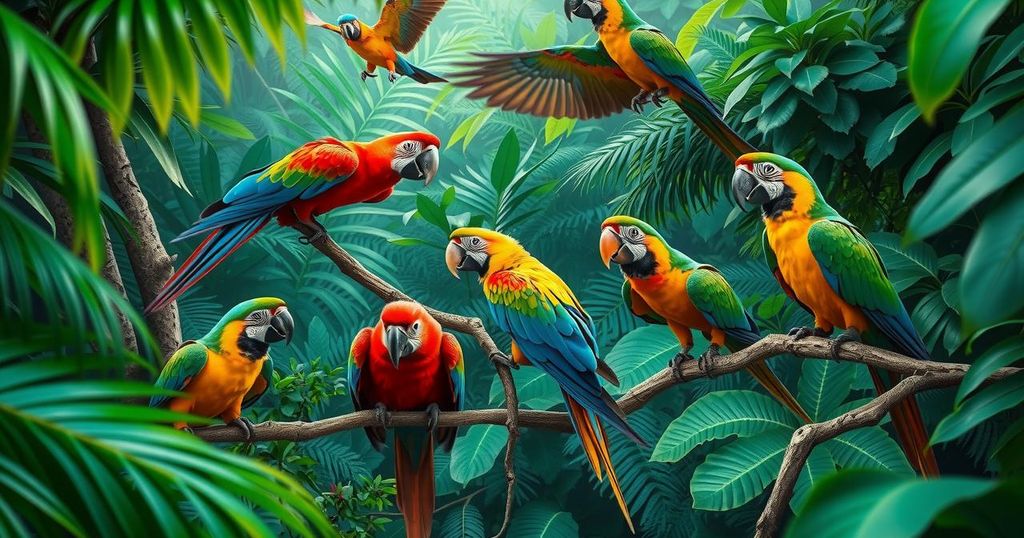Group Seeks Stronger Protection of Parrots in Nigeria

Wild Africa and the World Parrot Trust have called for stronger protections for parrots in Nigeria on World Parrot Day. In light of illegal trade and habitat loss, they emphasize the ecological importance of parrots and ask for public awareness and tougher enforcement of conservation laws. Recent successes against trafficking demonstrate progress, yet more efforts are needed to combat the threats facing these species.
In light of World Parrot Day, Wild Africa and the World Parrot Trust have issued a plea for enhanced protection of parrot species in Nigeria. This appeal, released by representatives of the groups in Lagos, emphasizes the urgent need to combat illegal trade which threatens the survival of various parrot species. The statement highlights the vital ecological role parrots play, particularly in maintaining the health of forest ecosystems through seed dispersal and regeneration efforts, yet they continue to face dire threats.
The ongoing decline of parrots, notably the African Grey Parrot, has been attributed to extensive trapping and trafficking over the years. Despite national and international laws in place to protect them, ineffective enforcement has allowed the exotic pet trade to flourish. Alarmingly, it is noted that over 1.2 million wild-caught grey parrots were exported in just 40 years, with as many as 60 percent succumbing during capture and transport. This staggering figure suggests the total trade could affect up to three million birds.
Some positive strides have been observed in Nigeria’s fight against illegal wildlife trafficking. For instance, the Nigeria Customs Service successfully intercepted a shipment containing over 300 parrot heads as of March 2025, bringing significant attention to the brutality associated with poaching. In a separate incident, three suspected traffickers were arrested in Abuja, caught with live African grey parrots and other species. Furthermore, wildlife officers seized 12 live grey parrots en route between Kaduna and Lagos, with the rescued birds now receiving care at Pandrillus Nigeria Drill Ranch.
Dr. Mark Ofua, spokesperson for Wild Africa, pointed to the crucial ecological significance of parrots, calling them “keystone species.” He remarked on their intelligence and social nature, urging for concerted conservation efforts. He stated, “Parrots are more than just brilliant colours and clever mimicry—they are vital ambassadors of our planet’s wild places.” Ofua emphasized the importance of preserving their habitats and safeguarding their freedom.
Meanwhile, Mr. Ifeanyi Ezenwa of the World Parrot Trust noted the dangers facing grey parrots in Nigeria and praised efforts by NESREA, NCS, and NPS to combat illegal trading. He lamented, however, that public ignorance regarding the harmful impact of parrot exploitation continues to hinder conservation.
The groups emphasized that Nigeria is taking actionable steps to tackle illegal wildlife trade through the introduction of the Endangered Species Conservation and Protection Bill, for which quick passage is advocated. They stress the necessity of public education to help diminish the desire for parrots as pets.
Both Wild Africa and the World Parrot Trust are committed to promoting stronger conservation policies that protect Nigeria’s parrot populations, utilizing various media platforms such as radio, TV, and print to raise awareness. They called for collaborative efforts among governments, businesses, and individuals to safeguard these essential birds for future generations.
In conclusion, the appeal by Wild Africa and the World Parrot Trust for stronger protection of parrots in Nigeria highlights the critical need for action amid ongoing threats from illegal trade. With important recent developments in law enforcement against wildlife trafficking, specialized education initiatives are also necessary to reduce pet trade demands. Collaborative efforts among various stakeholders are essential to ensure the survival of Nigeria’s parrot populations before it becomes too late.
Original Source: nannews.ng







